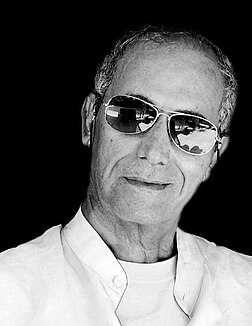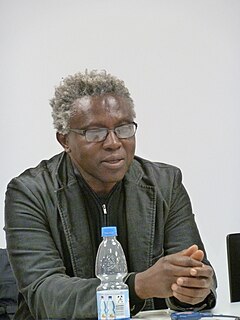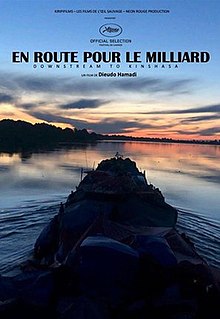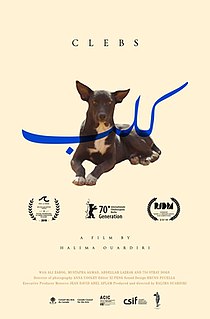Related Research Articles

The Carthage Film Festival (CFF) is a film festival that takes place in Tunis. More often known in Tunisia and Europe by the abbreviation JCC, from its French name, Journées cinématographiques de Carthage, or by its Arabic title, أيام قرطاج السينمائية, it was created in 1966. It is to date the oldest event of its kind still active in Africa. Initially biennial alternating with the Carthage Theatre Festival, it became annual in 2014. A directing committee chaired by the Tunisian Ministry of Culture, joined with professionals of the cinema industry, is in charge of the organization.

Danielle Arbid is a French Lebanese filmmaker and artist. She has been directing films since 1997.

Layth Abdulamir is an Iraqi-French filmmaker born on 24 October 1957 in Iraq. He has been studying film in Paris, France, from 1977 to 1980, and in Kiev from 1980 to 1986. Since 1994, he defended his dissertation at the Rylsky National Academy of Sciences of Ukraine,. He received his PHD degree in Cinematic Critic he has made several documentary films for various TV channels in France and for Dubai TV in the United Arab Emirates (1999-2004).In 2021, Layth Abdulamir’’s book "Extreme cinema, transcending the borders of aesthetics” was published by Arwegh مؤسسة أروقة للدراسات والترجمة والنشر Editions in Cairo.
The Cinema of Niger began in the 1940s with the ethnographical documentary of French director Jean Rouch, before growing to become one of the most active national film cultures in Francophone Africa in the 1960s-70s with the work of filmmakers such as Oumarou Ganda, Moustapha Alassane and Gatta Abdourahamne. The industry has slowed somewhat since the 1980s, though films continue to be made in the country, with notable directors of recent decades including Mahamane Bakabe, Inoussa Ousseini, Mariama Hima, Moustapha Diop and Rahmatou Keïta. Unlike neighbouring Nigeria, with its thriving Hausa and English-language film industries, most Nigerien films are made in French with Francophone countries as their major market, whilst action and light entertainment films from Nigeria or dubbed western films fill most Nigerien theatres.
Flora Gomes is a Bissau-Guinean film director. He was born in Cadique, Guinea-Bissau on 31 December 1949 and after high school in Cuba, he decided to study film at the Instituto Cubano del Arte y la Industria Cinematográficos in Havana.

The Festival International du Film Francophone de Namur (FIFF) is a festival dedicated to French speaking films in Namur, Belgium created in 1986, reflecting francophone diversity, from Europe, Canada and Africa.
The Draughtsmen Clash is a 1996 film directed by Balufu Bakupa-Kanyinda of the Democratic Republic of the Congo.
Guy Bomanyama-Zandu is a filmmaker from the DRC.
Cinema of the Democratic Republic of the Congo (DRC) originated with educational and propaganda films during the colonial era of the Belgian Congo. Development of a local film industry after the Democratic Republic of the Congo became independent in 1960 was handicapped by constant civil war.
Mwezé Ngangura is a film director from the Democratic Republic of the Congo (DRC).

Marc-Henri Wajnberg is a Belgian film director born in 1953. He is also a screenwriter, an actor and the co-founder and CEO of Wajnbrosse Productions.
Kiripi Katembo, also known as Kiripi Katembo Siku, was a Congolese photographer, documentary filmmaker and painter. Katembo's short films, photography and other projects focused on the daily lives of the people of Kinshasa, as well as the economic and social challenges facing the Democratic Republic of the Congo. He was also a founding director of Mutotu Productions, his film production company, and the executive director of Yango Biennale, based in Kinshasa.

Taïeb Louhichi was a Tunisian film director, screenwriter, and filmmaker. His best known works include his debut feature film, Shadow of the Earth (1982), Layla, My Reason (1989), and La Danse du vent (2004).

Jean-Marie Teno is a Cameroonian film director and filmmaker, "one of Africa's most prolific filmmakers".

Ridha Behi is a Tunisian director and producer. He is known for The Magic Box and Always Brando (2011).
Charles Mensah was a Gabonese filmmaker, screenwriter and production manager. Popularly known as "The Gentleman of African Cinemas", Mensah contributed in several critically acclaimed documentaries including Équateur, Les Couilles de l'éléphant and Lybek, the crunch of the alive. He worked as an activist for the development of independent southern cinema for a career spanned more than three decades.

Downstream to Kinshasa is a documentary film from the Democratic Republic of the Congo, directed by Dieudo Hamadi and released in 2020. The film centres on survivors of the DRC's Six-Day War of 2000, many of whom are travelling to Kinshasa to demand compensation from the government for the losses they incurred during the conflict.

Mutts is a Canadian short documentary film, directed by Halima Ouardiri and released in 2019. The film is a portrait of a sanctuary for stray dogs in Morocco.
Jean-Michel Kibushi Ndjate Wooto, is a Congolese stop-motion animator. He is the pioneer of African animation, and widely considered to be the first Congolese animator.
Général, nous voilà! is a 1997 documentary film directed by Ali Essafi in his directorial debut. It won a Grand Jury Award at the Festival International du Film Francophone de Namur. It was shown at the Carthage Film Festival and at the Paris Biennale of Arab Cinema.
References
- 1 2 "The Nigger Who Dared Conquer The Sky". Extra City Kunsthal. Retrieved 18 March 2012.
- 1 2 3 4 "Congolese filmmaker Balufu Bakupa-Kanyinda Recovery of cinemas in Kinshasa". San Finna. 14 August 2011. Retrieved 18 February 2012.[ permanent dead link ]
- ↑ "BALUFU BAKUPA-KANYINDA". Mubi. Retrieved 18 March 2012.
- ↑ Colm McAuliffe (16 November 2015). "The death of cinema in Congo: how churches killed off cowboy films: As the country is left without a single film theatre, a new documentary explores the end of a once thriving movie culture". The Guardian. Retrieved 8 October 2018.